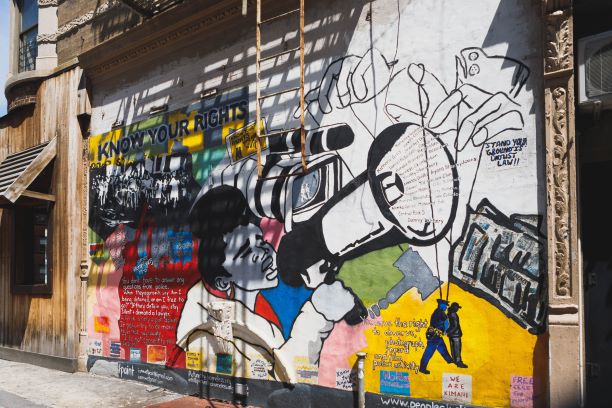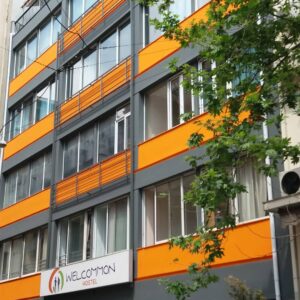
Anemos Ananeosis / Wind of Renewal participates in the initiative COMMON GROUND connecting for social change, together with a number of civil society’sorganisations

Over the past few weeks, we have been busy organizing an initiative to express civil society’s collective dismay and concern about being left out of the design and implementation of Greece’s COVID-19 recovery plan.
Greece will receive €32 billion from the EU in a combination of grants and loans. We must ensure that this substantial amount of money is not wasted on ineffective or exclusive policies, but rather goes toward meeting the needs of all people living in Greece, especially those in greatest need of support. In other words, spending must prioritize green and socially just initiatives.
We’ve heard lots of rhetoric from the EU and the Greek government about how these funds will grow the economy, improve society, fight climate change, and improve resilience so we can weather the next storm, whether it comes in the form of another pandemic or something else. But how will this money actually be spent? Will it simply pay lip service to these noble goals or will it really transform society’s underlying problems and structural flaws that have led us into the current mess?
In this spirit, we and Greenpeace have submitted an open letter to Deputy Finance Minister Skylakakis, co-signed by 70+ of our civil society peers, including many of you reading this. Our demands are clear: don’t leave us out of the process of designing the recovery initiatives because we, the people on the ground working with and representing some of society’s most vulnerable communities, understand Greece’s needs and we have thoughtful, detailed proposals on how we can meet them. Our input will not only strengthen the plan’s proposals but will also generate public buy-in, which is crucial to the plan’s success. We also insist on full transparency and accountability.
With the EU deadline looming, we understood that time was running out for the National Recovery and Resilience Plan to benefit from civil society’s valuable insights. Accordingly, last week on March 23rd, we and Greenpeace submitted an open letter to Deputy Finance Minister Mr. Skylakakis demanding meaningful opportunities to contribute to the recovery plan.
We have still not received a response. And yet, a few days later, the Greek cabinet approved a final version of the plan, announced it publically, and is expected to submit it to parliament this week before sending it to Brussels for approval. This leaves no time for us or Greek MPs to give feedback on the plan’s content and strategic directions (it’s hefty, at an estimated 2,000 pages!) But we are not giving up! There is still time to act.
Opne letter to Depute Finance Minister Mr Skylakakis and Prime Minister Mr Mitsotakis
To Deputy Minister of Finance, Theodoros Skylakakis
CC: Prime Minister Kyriakos Mitsotakis
Minister of Finance, Christos Staikouras
The European Commission Recovery and Resilience Task Force (RECOVER)
Athens, Tuesday 23rd March 2021
Open letter about the Greek Recovery and Resilience Plan: opacity and lack of participation
Dear Mr. Minister,
The signatory Civil Society Organisations would like to express our concerns about the opacity in the design and adoption of the Greek Recovery and Resilience Plan. The EU recovery plan is a huge opportunity for member states to address the economic and social consequences of the Covid-19 pandemic and to create greener and fairer societies that are resilient to future challenges. At this critical time when the pandemic is affecting millions of lives and especially the most vulnerable populations, it is very important that such an opportunity is not missed.
The absence of broad social participation in the formulation of the Recovery and Resilience Plan worries us intensely. We recall that under Article 18.4 (q) of the Recovery and Resilience Facility Regulation, member states must include “a summary of the consultation process carried out with local and regional authorities, social partners, civil society organisations, youth organisations and other relevant stakeholders for the preparation and implementation of the plan and information on how the input of stakeholders is reflected in the plan.”
So far however, planning procedures for the Recovery and Resilience Plan have starkly contrasted the spirit of this regulation. More specifically:
- The virtual public consultation on the “Strategic Directions of the National Recovery and Resilience Plan” posted by the Ministry of Finance on 25 November 2020 consisted only of a general text with unclear terms and lacked a roadmap for implementation. As such, it is impossible for interested parties to thoroughly evaluate the proposal since the complete draft submitted by Greece to the European Commission has not been made publicly available.
- Greece sent the draft Recovery and Resilience Plan to the European Commission before the end of the public consultation period, thus it excluded the feedback submitted by civil society during the consultation process.
- The public consultation report has not been published and we have not received any information on if and how the proposals we submitted were taken into account in revising the plan, when the revisions will be complete, or what the next steps will be.
- We remain in the dark regarding procedures for submitting the final draft to the EU as well as whether stakeholders will be given the opportunity to provide feedback on the final text, which will outline how resources will be allocated. We are concerned that submitting the final plan for public consultation only at the end of the revision process will exclude Greek society from substantially contributing to the plan’s development.
For all the above reasons, we respectfully insist on full transparency regarding the development of sustainable recovery policies, both for the sake of monitoring and accountability and in order to keep the citizenry informed, which are essential for their successful implementation.
Mr. Minister, the recent crises (economic, refugee, pandemic) have deepened social inequalities in our country and require us to make radical changes to mitigate their effects on society. Greece should prioritise social inclusion by targeting typically overlooked populations such as impoverished households, the homeless, migrants, and refugees. The country also needs to invest in stronger social and labour policies and in public health with an emphasis on prevention, education and culture. The digital transition is an essential tool for achieving these goals. At the same time, measures must be taken to protect the environment and reduce the effects of climate change in order to prevent future crises and ensure a swift transition to a green and just economy.
To do this, the Greek government must:
- Invite broader swaths of society, and in particular civil society with relevant knowledge and experience, to submit proposals that will be integrated into the “Strategic Directions of the National Recovery and Resilience Plan”
- Prepare a detailed action plan outlining proposed programmes, objectives, beneficiaries and expected impact, which includes valid environmental, social and economic indicators to assess the projects’ progress based on the stated priorities. All programmes and objectives must meet the following criteria:
-Ensure a sustainable future
-Contribute to social justice
-Safeguard our fundamental rights
- Ensure a meaningful participation of all stakeholders, including civil society organisations, in the design, implementation and monitoring of the Recovery and Resilience Plan. This process must take place before the government submits its plan at the end of April 2021
- Improve clarity and transparency around the Recovery and Resilience Plan. This includes publicising available funding instruments and outlining priorities at both the EU and national levels. Regular information exchange sessions with stakeholders and citizen information campaigns are also necessary, among other things.
We consider the above measures necessary not only for the proper use of available public resources but also in order to garner citizen support for the initiative. Finally, we emphasise that for the Recovery and Resilience Plan to have a positive effect, it should not be seen as a stand-alone initiative. Rather, it should constitute part of a horizontal and coordinated effort to strengthen public policies that, combined with other initiatives and funding opportunities, will lead us to a better and more sustainable future. Policies and programmes that do not align with the plan but lead us astray from strategic objectives agreed upon by the EU, must be ruled out or redesigned in a manner that supports a green and fair recovery.
We remain at your disposal for any discussion and contribution to the formulation of a national recovery plan that reflects Greece’s real needs for a sustainable and socially just future.
Yours sincerely,
The undersigned organisations
- ActionAid Hellas
- Action for Wildlife
- ANTIGONE – Information and Documentation Centre on Racism, Ecology, Peace and Non Violence
- Archipelagos Institute of Marine Conservation
- Arion – Cetacean Rescue and Rehabilitation Research Center
- ARSIS – Association for the Social Support Youth
- Association of Social Responsibility for Children and Youth -Skep
- Attica Bike Community – Podilattiki Koinotita
- Better Days Greece
- Boroume
- Callisto
- Centre for Research on Women’s Issues “Diotima”
- Changemakers Lab
- Common Ground Greece
- Doctors of the World Greece
- DRC Greece
- ECHO100PLUS
- Ecocity
- Ecological Movement of Drama
- Ecological Movement of Patras
- Ecological Movement of Thessaloniki
- Ecological Recycling Society
- ELIX
- Emfasis Foundation
- Ethelon
- European Expression
- Fenix – Humanitarian Legal Aid
- Food On
- Friends of Monte
- Generation 2.0 for Rights, Equality and Diversity
- GIVMED
- Greek Association of People Living with HIV “Positive Voice”
- Greek Council for Refugees (GCR)
- Greek Forum of Migrants
- Greek Forum of Refugees
- Greek Housing Network
- Greenpeace Greece
- Hellenic Liver Patient Association “Prometheus”
- HIAS
- HIGGS
- HumanRights360
- International Rescue Committee (IRC)
- Irida Women’s Center
- iSEA
- Ithaca
- Ithaca Laundry
- Lesvos Solidarity
- MEDASSET
- Mediterranean Institute for Nature and Anthropos – MedINA
- Melissa Network
- METAdrasi – Action for Migration and Development
- Mobile Info Team (MIT)
- Nature Friends Greece
- Network for Children’s Rights
- NPCP “Me Alla Matia”
- Odyssea
- Organization Earth
- Organization Tulipa Gulimi
- Pan-hellenic Network of Ecological Organizations
- People Behind
- Praksis
- Promitheas
- Refugee Rights Europe
- Samos Volunteers
- Schedia Street Magazine
- Social Action and Innovation Center
- Society for the Care of Minors and Youth
- SolidarityNow
- SOS Children’s Villages
- Steps
- Symbiosis-School of Political Studies in Greece, affiliated to the Council of Europe Network of Schools
- Syn-eirmos NGO of Social Solidarity
- Terre des hommes Hellas
- Thalassa of Solidarity
- The Bee Camp
- The Good House
- The Green Tank
- The HOME Project
- Union for the Protection of the Environment of the Corinthian-Patra Gulf – O Nireas
- Velos Youth
- We are Solomon
- Wind of Renewal
- WWF Greece
CALL TO ACTION!
Follow our suggestions, or invent your own action:
- Inform parliamentarians (all of them or selected ones) that civil society was excluded from all stages of developing the National Recovery Plan and that this is not okay. Call them, email them, use social media, and even fax them!
- Email Deputy Finance Minister Skylakakis demanding full transparency and to be involved in the subsequent phases of the recovery plan.
- Tell Prime Minister Mitsotakis that exclusion is not an option! Explain that a green and just recovery requires transparency and inclusive participation.
- Encourage your peers, colleagues, donors, friends, partners, members, etc. to do the same in their individual capacities. We must all be well-informed, active citizens and make clear to our government that we are following developments closely and will hold them accountable.
The Common Ground Team
